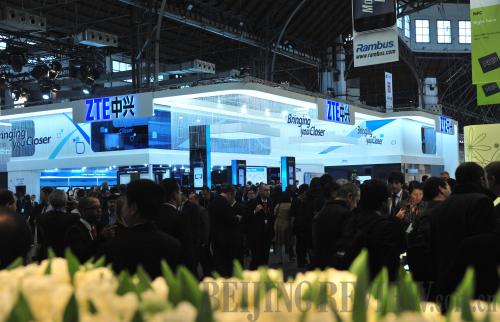|
 |
|
EYE-CATCHING COMPANY: ZTE's promotion booth at the Mobile World Congress held in Barcelona, Spain, in February 2011 (CHEN HAITONG) |
This is not the first time that Huawei and ZTE, the world's No.2 and No.5 telecom equipment makers, have been attacked for their international forays.
On October 8, 2012, the U.S. House of Representatives Intelligence Committee issued a report alleging that Huawei and ZTE posed a possible threat to U.S. national security, suggesting the American Government not use equipment manufactured by the two companies. On October 14, the U.S. Congress launched second-round investigations against the two Chinese firms.
However, a White House-ordered review of possible security risks found no evidence that either company had been involved in spying.
On January 31, 2013, the U.S. International Trade Commission (USITC) initiated a Section 337 investigation into wireless devices from four communications companies, including Huawei and ZTE, for patent infringement. Within 45 days the USITC will set a target date for completing the investigation. Should the complaint be approved, the panel will issue remedial orders, such as an import ban on select products.
Mired in a slow economic recovery and the eurozone sovereign debt crisis, the United States and EU have decided to express their frustrations by launching several investigations against Chinese telecom equipment providers.
The reasons for the most recent action is simply because the EU plans to use Huawei and ZTE to further trade negotiation with the Chinese Government, say analysts. The EU is currently carrying out its biggest ever anti-dumping investigation into Chinese solar panel exports, and is expected to make a formal decision about whether to impose temporary duties by the end of May.
Latest figures show that Huawei and ZTE have nearly 20 percent of the market in the EU. In sharp contrast, European vendors such as Ericsson, Alcatel-Lucent and Siemens-Nokia are suffering from slumping business revenue and shrinking profits, Xiang Ligang, an observer of China's telecom sector, told Southern Metropolis Daily.
Alcatel-Lucent plans to lay off 7 percent of its employees; Siemens-Nokia says it will lay off 17,000 employees, one quarter of its global total. With Huawei catching up quickly, Alcatel-Lucent's reign at the top will soon be over, says Xiang. Lower labor costs in China put the two Chinese companies at an advantage. Research and development staff is plentiful as universities annually pump out countless graduates, Xiang adds.
The EU's demands are not even feasible. Telecom products are frequently upgraded and have complicated product packages. It's not realistic to raise the price by 29 percent, said Xiang.
"The development of companies should be determined by free market competition, instead of the outcry of government officials," Xiang says.
Wang Weiguo, Dean of Civil, Commercial and Economic Law School at China University of Political Science and Law, agrees with Xiang. Wang thinks that the EU uses subsidies as an excuse to block Chinese companies from making inroads into the EU market. The EU is simply practicing trade protectionism, he says.
"A continuous sluggish economy has led EU companies to take action. Chinese telecom equipment companies have sharp competitiveness in prices. This is the fundamental reason for the EU's attack on Huawei and ZTE, not the alleged dumping or illegal subsidies," said Wang.
Overseas expansion of Huawei and ZTE poses a threat to the EU. In 2012, the business revenue of Huawei terminals totaled $2 billion, 25 percent of the global total. Among the total, smart phones account for 70 percent of the business revenue and the growth rate is predicted to reach 50-80 percent in 2013, notes a report from China Business News.
Another reason is that the EU is drooling over China's broad 4G market.
China Mobile will allocate 28 billion yuan ($4.5 billion) in 2013 to its TD-LTE (4G) network construction, up from the 5-billion-yuan ($802.1 million) expenditure in 2012. The company will build or upgrade 200,000 TD-LTE base stations in 100 Chinese cities in 2013.
| 